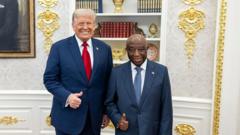Tibetan spiritual leader the Dalai Lama is set to unveil possible succession details amid celebrations marking his 90th birthday, which has drawn significant attention from both followers and geopolitical observers.
**Dalai Lama's 90th Birthday Sparks Speculation About Succession Plans**

**Dalai Lama's 90th Birthday Sparks Speculation About Succession Plans**
As the Dalai Lama approaches his 90th year, his followers look for clues regarding his succession.
Amidst a throng of followers in Dharamsala, the Dalai Lama is expected to shed light on potential plans for his succession during his birthday celebrations.
On a momentous occasion where he reaches the age of 90, the Dalai Lama's followers have congregated in northern India, eager for insights into the future leadership of Tibetan Buddhism. According to his office, a video message and statement are expected to be released soon, though specifics remain unclear. The Dalai Lama, who has been a critical voice for Tibetan autonomy and human rights since fleeing to India in 1959, has been deliberating on whether the institution of the Dalai Lamas should continue.
The birth anniversary celebration corresponds with the 15th Tibetan Religious Conference, inviting more than 7,000 guests, including significant figures from political circles. Notable attendees include Hollywood actor Richard Gere, a staunch advocate for Tibetan rights. The Dalai Lama indicated earlier this week that a framework for discussing the future of the Dalai Lama institution could soon emerge, though he has provided no details.
For years, the spiritual leader's considerations regarding his succession have sparked widespread debate. He has previously suggested that his successor might be female or potentially that no successor is warranted. However, recent remarks suggest that continued support from the Tibetan community may push for the lineage to carry on under his office's selection. Critically, he insists that the next Dalai Lama must be born outside of Chinese control, a sentiment that has drawn ire from Beijing.
The implications of a succession announcement have drawn mixed reactions, with concerns about how China may respond. Analysts anticipate that the Chinese government may try to assert control by identifying its own designated successor, a move that would be widely rejected by Tibetan exiles and by the global community.
Despite ongoing Chinese attempts to manipulate the narrative surrounding Tibetan leadership, the collective sentiment among Tibetan leaders suggests resilience. "No Dalai Lama chosen by China will have legitimacy," emphasizes Youdon Aukatsang, a member of the Tibetan parliament-in-exile.
Reflecting on the future, many attendees express hope for the diplomatic resolution of Tibet's contested governance. Although some believe a vacancy will persist in the Tibetan leadership, they commit to sustaining the movement regardless. As the Dalai Lama prepares to deliver his birthday address, the world watches closely for hints of continuity in the revered lineage of Tibetan spirituality.
On a momentous occasion where he reaches the age of 90, the Dalai Lama's followers have congregated in northern India, eager for insights into the future leadership of Tibetan Buddhism. According to his office, a video message and statement are expected to be released soon, though specifics remain unclear. The Dalai Lama, who has been a critical voice for Tibetan autonomy and human rights since fleeing to India in 1959, has been deliberating on whether the institution of the Dalai Lamas should continue.
The birth anniversary celebration corresponds with the 15th Tibetan Religious Conference, inviting more than 7,000 guests, including significant figures from political circles. Notable attendees include Hollywood actor Richard Gere, a staunch advocate for Tibetan rights. The Dalai Lama indicated earlier this week that a framework for discussing the future of the Dalai Lama institution could soon emerge, though he has provided no details.
For years, the spiritual leader's considerations regarding his succession have sparked widespread debate. He has previously suggested that his successor might be female or potentially that no successor is warranted. However, recent remarks suggest that continued support from the Tibetan community may push for the lineage to carry on under his office's selection. Critically, he insists that the next Dalai Lama must be born outside of Chinese control, a sentiment that has drawn ire from Beijing.
The implications of a succession announcement have drawn mixed reactions, with concerns about how China may respond. Analysts anticipate that the Chinese government may try to assert control by identifying its own designated successor, a move that would be widely rejected by Tibetan exiles and by the global community.
Despite ongoing Chinese attempts to manipulate the narrative surrounding Tibetan leadership, the collective sentiment among Tibetan leaders suggests resilience. "No Dalai Lama chosen by China will have legitimacy," emphasizes Youdon Aukatsang, a member of the Tibetan parliament-in-exile.
Reflecting on the future, many attendees express hope for the diplomatic resolution of Tibet's contested governance. Although some believe a vacancy will persist in the Tibetan leadership, they commit to sustaining the movement regardless. As the Dalai Lama prepares to deliver his birthday address, the world watches closely for hints of continuity in the revered lineage of Tibetan spirituality.




















